Lewis Hamilton: Not just points deficit concerning champion's recovery
- Published
- comments
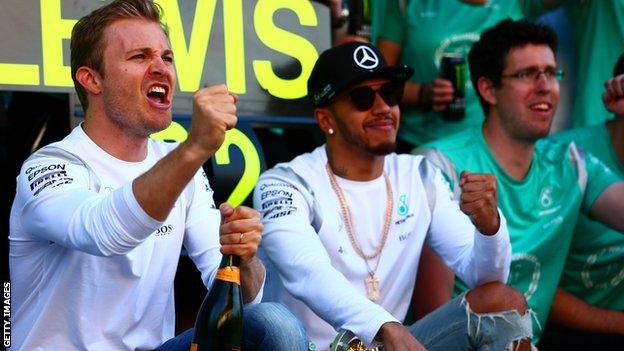
Hamilton trails Rosberg by 43 points in the drivers' championship
"My concern is not about beating Nico; I don't have a problem with that," Lewis Hamilton said on Sunday evening, at once revealing the innate sense of superiority he feels about his team-mate Rosberg, and diminishing - inadvertently or otherwise - the merit of the German's victory in the Russian Grand Prix.
Except, right now, Hamilton does have a problem with that. Both in the micro sense, in that he keeps hitting snags that prevent him challenging Rosberg in races. And in the macro, in that Hamilton now faces a gargantuan task in overhauling the deficit he faces in the championship.
Rosberg's fourth win in four races this season - and seventh in a row going back to Mexico last year, the race after Hamilton clinched his third world title - has put him 43 points ahead in the championship.
What that means in mathematical terms is that it would take a win and a second place for Hamilton, and Rosberg not scoring for two races, for the Englishman to draw level.
That is difficult enough in itself, but it is going to be impossible if Mercedes cannot get on top of the mysterious ailments afflicting Hamilton's car.
A recurring problem
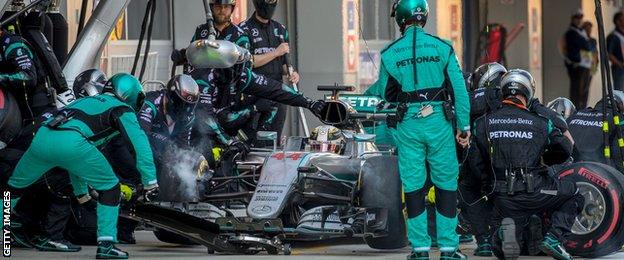
Hamilton has suffered problems with his car in every race of the 2016 season so far
Hamilton's hopes of victory were dashed for the second race in a row by a failure in the MGU-H, the part of the hybrid system that recovers energy from the turbo in these highly complex, revolutionary engines.
In China two weeks ago, it consigned him to the back of the grid, from where he was hit by a back marker at the first corner and could only recover his damaged car to seventh place.
In Russia, the problem hit a little later, just before the start of the final part of qualifying, so Hamilton could at least start in 10th place.
From there, he was fourth on lap one, after navigating carefully through the first-corner melee in front of him, and a de facto second by lap 19. He was closing on Rosberg, and entertaining thoughts of victory, when another engine problem - this time a loss of water pressure - forced him to back off and defend to the finish.
Hamilton, who cut a forlorn figure on the rostrum after the race, handing his bottle of champagne to the Mercedes engineer there to collect the trophy for winning constructor, is really being put through the mill at the moment.
He has, as he said on Saturday, "had way darker days than this" in his career. But there is no doubting that he cannot catch a break right now.
Let us just take a moment to look at his season so far:
Australia: a relatively slow start from pole - although within the "scatter" engineers expect of a normal start after the restrictions on driver aids this year - left him battling with Rosberg into the first corner. They touched, pushing Hamilton wide, and he dropped to fifth. He recovered to finish second.
Bahrain: after another bad start - this time caused because the wait revs would not settle, delaying his reaction to the lights - he was clouted by Williams' Valtteri Bottas at the first corner, dropping him to seventh. With a damaged car, he fought back to third.
China and Russia we know about.
Dismissing conspiracy theories

Totto Wolff dismissed people who believe Mercedes are hampering Hamilton's title defence as "lunatics"
Mercedes are mystified as to what is going on with engine reliability, after the car ran 800km a day trouble-free in pre-season testing.
Inevitably there have been accusations on social media that the team are favouring Rosberg to give him a chance to win the title after two years of being beaten by Hamilton, but Mercedes F1 boss Toto Wolff gave them short shrift.
"It is very difficult to take people seriously who are lying in bed with their laptop on their chest and just sending out those abusive messages," he said.
"You wonder what goes through people's minds. Of course we don't do it deliberately.
"I want to ignore this bunch of lunatics who think we would harm our driver who is a double world champion for us. He hasn't let us down and we wouldn't let him down.
"This is a mechanical sport and these things happen, we had a problem on the MGU-K drive on Nico's car and it looked as if he might not finish the race.
"We are pushing the limits a lot on the chassis and the engine in order to have a competitive car and this is why we are winning races, but if you push the limits at a certain stage you find them."
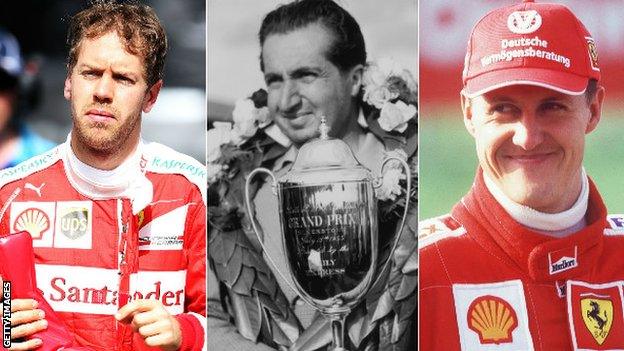
Rosberg joins Ascari and Schumacher in the 'seven wins in a row' club. Vettel has nine
How big is Hamilton's task?
Hamilton's problems mean that he is on the back foot in terms of engine parts for the rest of the season.
Drivers are only allowed to use five of each of the six elements that make up an F1 engine. And while Rosberg is on his first of everything, Hamilton is on a mix of second and third, even if in some cases (such as the internal combustion engine itself), the parts can be reused.
This means he has a higher probability than his team-mate of getting a grid penalty later in the season for using more than the permitted number of parts.
There is also a concern about whether the engine he used in Russia will have been terminally damaged.
He has another worry, too. In qualifying in Russia, Hamilton earned his second reprimand of the year, a decision he described as "just ridiculous", for going the wrong side of a bollard when rejoining the track.
Some would argue that his first reprimand was also harsh - for reversing in the pit lane in Bahrain when he had not been given clear indication where to park.
Whatever your view, this could have serious consequences. A third reprimand - surely almost inevitable in the remaining 17 races - would mean an automatic 10-place grid penalty.
Are Ferrari a team in crisis?
If Hamilton wants some succour, though, he might want to cast his mind back to 2010, and his old rival Fernando Alonso.
That year, the Spaniard left the British Grand Prix in July 47 points off the championship lead, held then by Hamilton. Seven races later, Alonso was leading it.
Hamilton can also find solace in the fact that, on average over the last two years, he has beaten Rosberg about twice for every once it has been the other way around.
But even that might not be enough. There are 17 races left in this longest of all F1 seasons. If Mercedes were to finish them all one-two, with the drivers winning on a ratio of 11-6, Hamilton would make up only 35 points over the season.
Of course, it will not work out that way.
Rosberg will inevitably hit his own problems at some point, and Mercedes will surely be beaten a handful of times, just as they were in 2014 and 2015.
There is also no guarantee Mercedes' advantage will remain as sizeable as it was in Russia, when it was bigger than at any point this season.
Ferrari will not be as poor as they were in Russia, a track that makes the car's gentleness on tyres a weakness, every weekend. They may even deliver on some of the promise they have shown this year.
And if the Renault engine upgrade promised for three races' time gives Red Bull as big a boost as is expected, they will also be in the mix.
But that rough maths is enough to illustrate just how big a job Hamilton has on his hands.
Should Lewis Hamilton be worried by Nico Rosberg's form?
A word for Rosberg
Hamilton's problems have inevitably garnered the lion's share of the publicity, which has meant Rosberg's winning streak has been overlooked, at least to an extent.
Seven consecutive wins, though, is an admirable achievement that merits marking. Only three other drivers - Alberto Ascari, Michael Schumacher and Sebastian Vettel - have achieved it before.
He has driven very well throughout, but it is wrong to say, as some did, that Rosberg "dominated the whole weekend" in Russia.
Hamilton was faster in second and third practice, and in the first part of qualifying. And he was closing in dramatically in the few laps before he was forced to back off, although Rosberg said that was due to traffic and the fact he was saving his tyres so he could push at the end.
Hamilton has a point, though, when he says: "He has been starting at the front with no-one to really bother him. So it has been a nice Sunday drive for him. But there are still 17 races to go, and still 17 races where I can give him hell."
There is every reason to believe the two men will be as closely matched as ever.
But on the evidence of their three years as team-mates, it would take a brave person to bet that, all things being equal, Hamilton will not beat Rosberg more often than not over the remainder of the year.
Whether that will be enough is another matter.
- Published1 May 2016
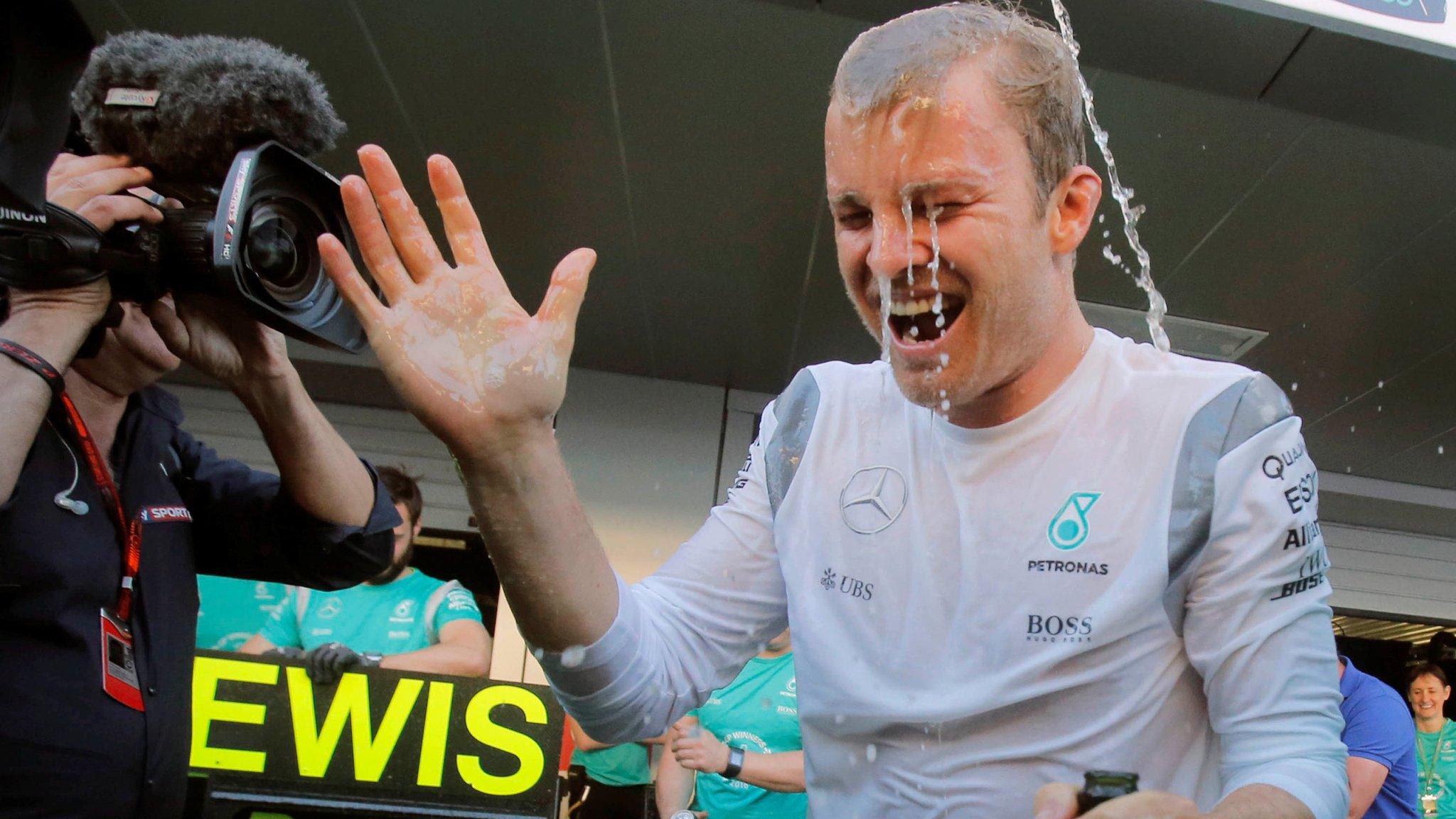
- Published1 May 2016
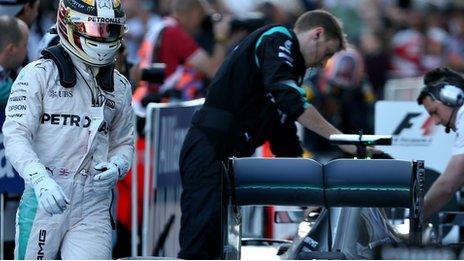
- Published18 December 2015

- Published1 May 2016
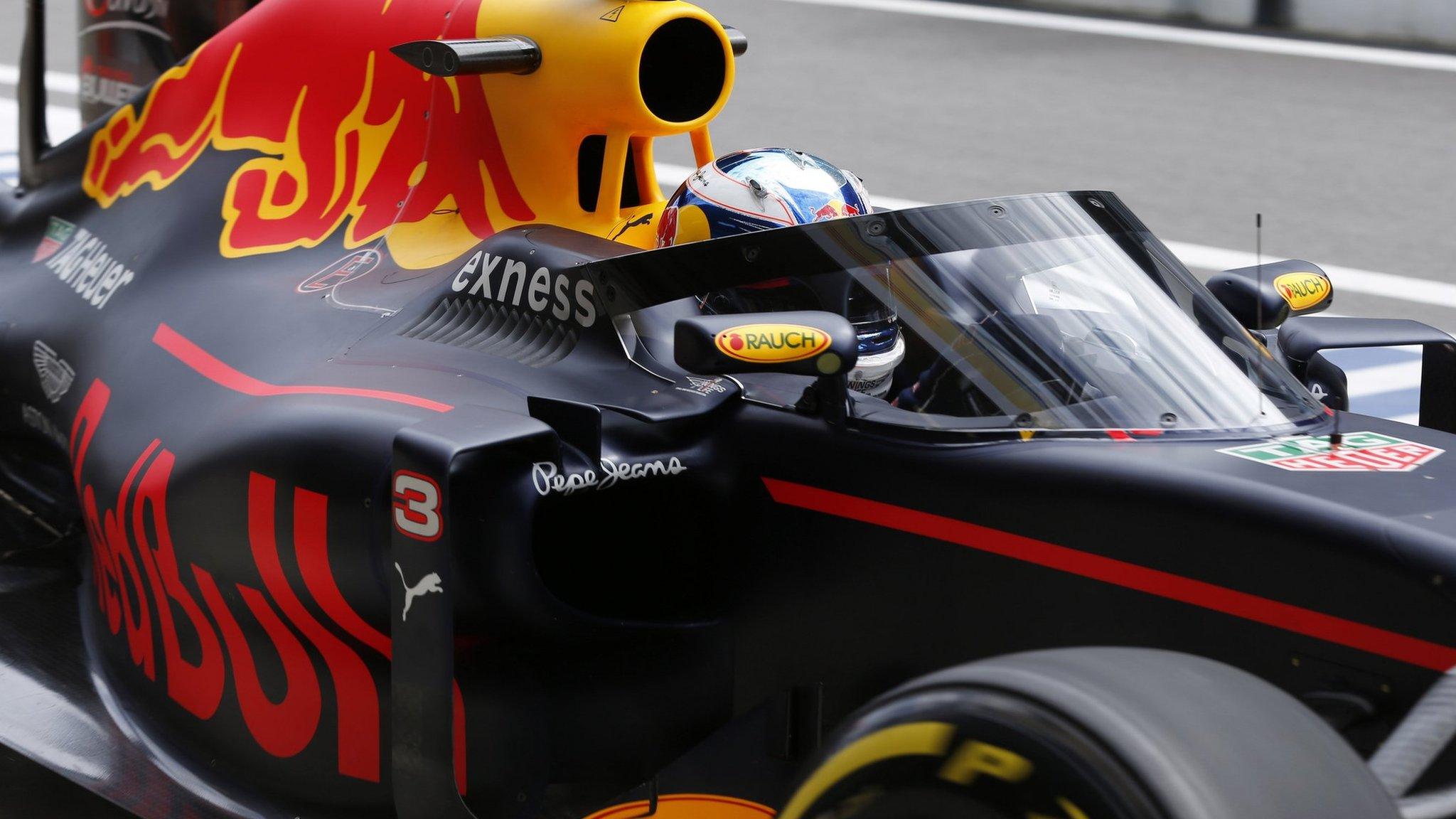
- Published29 April 2016
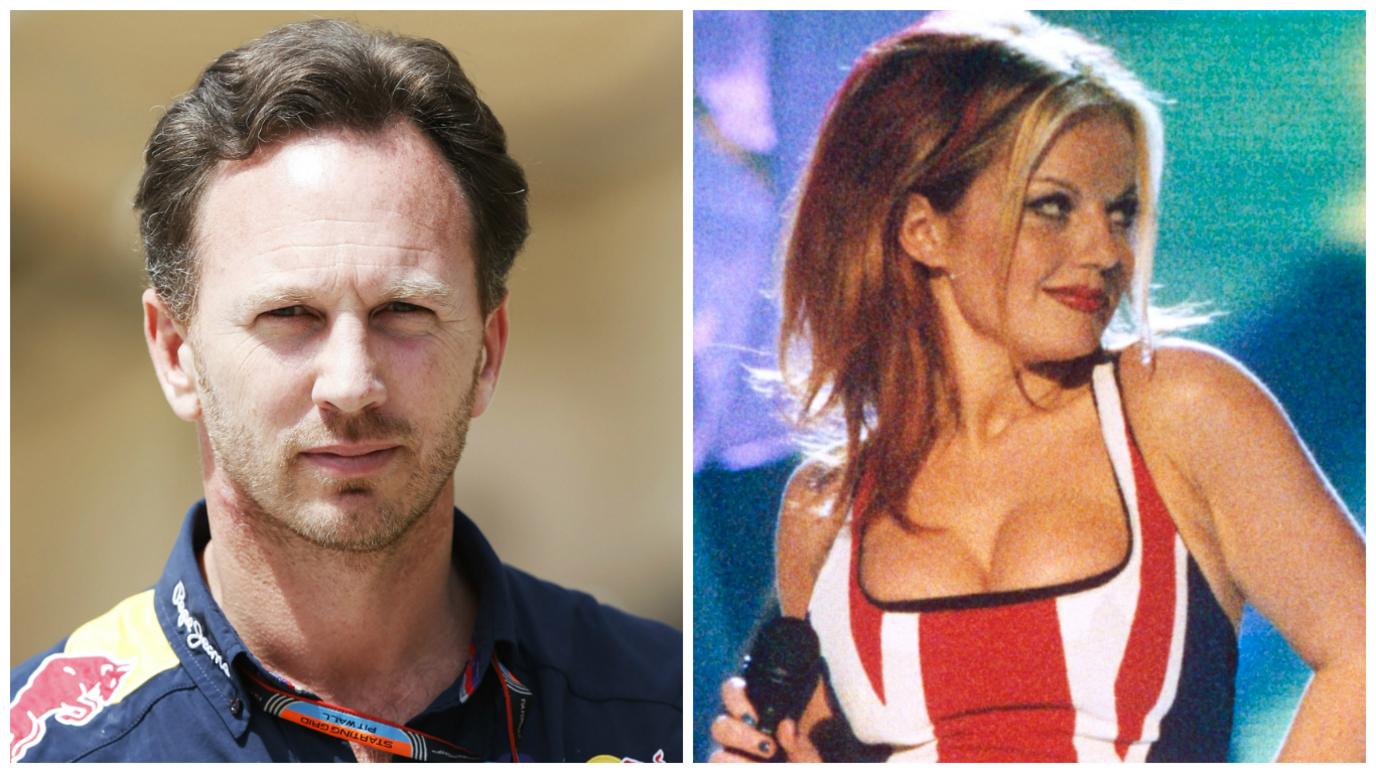
- Published1 May 2016
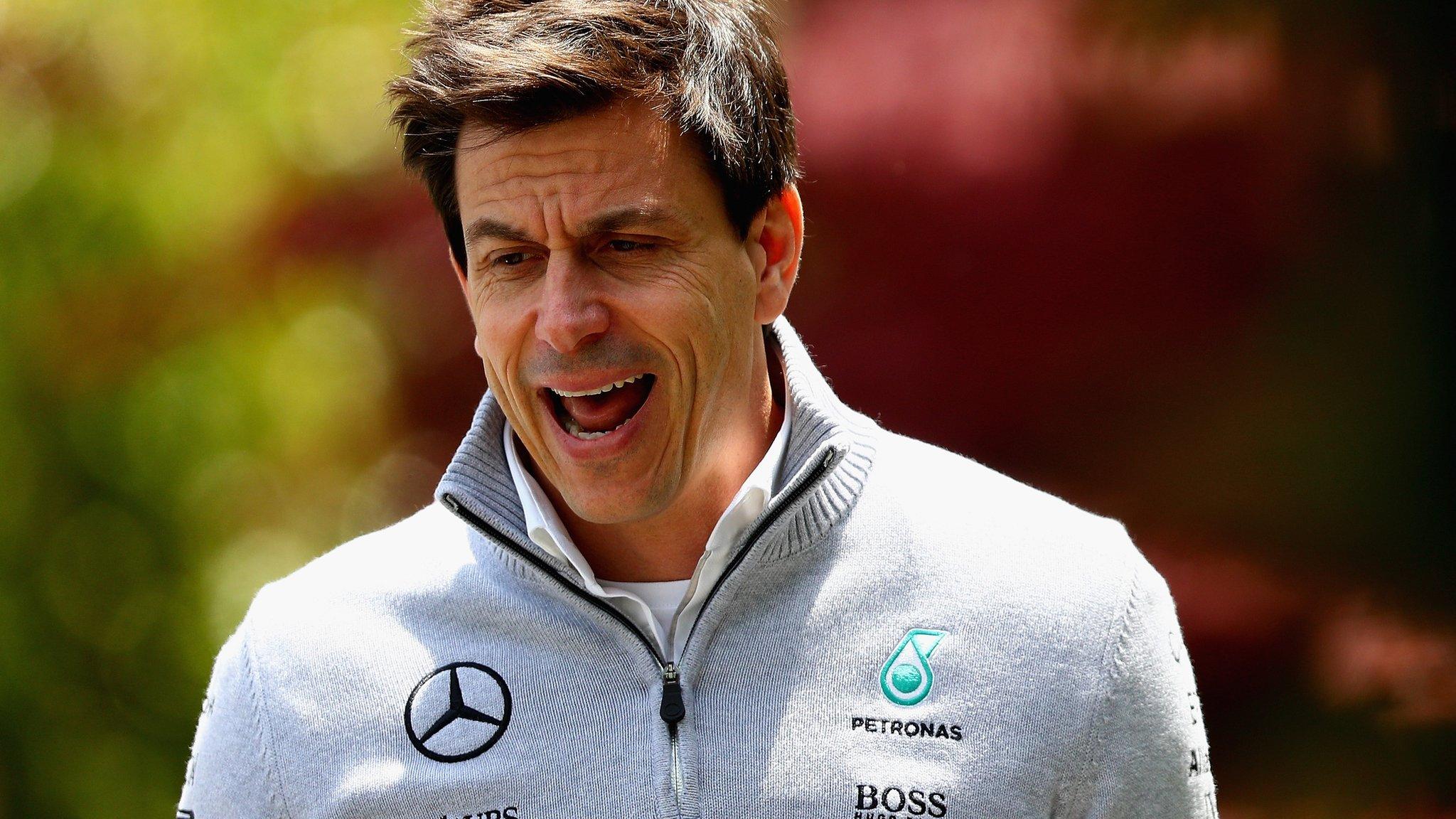
- Published2 November 2018

- Published26 February 2019
